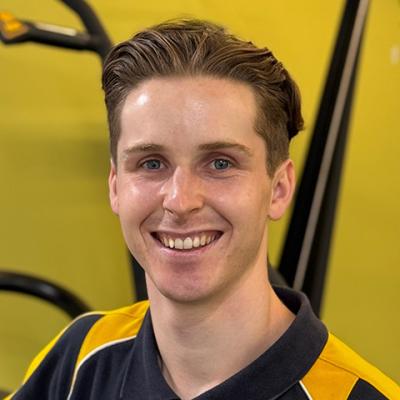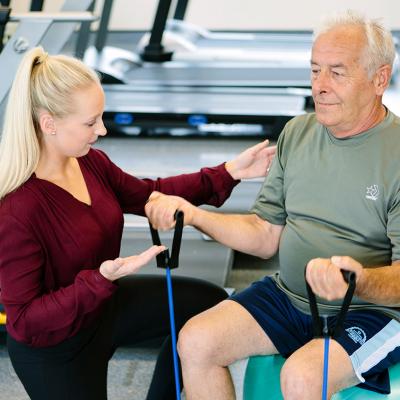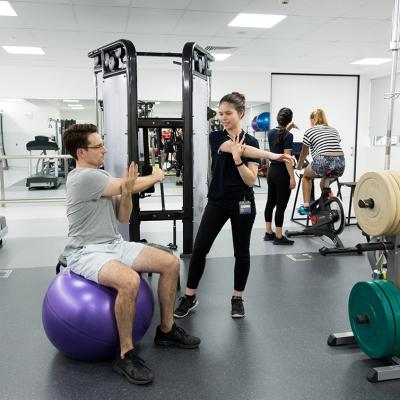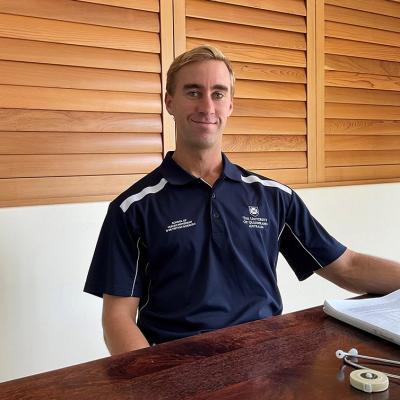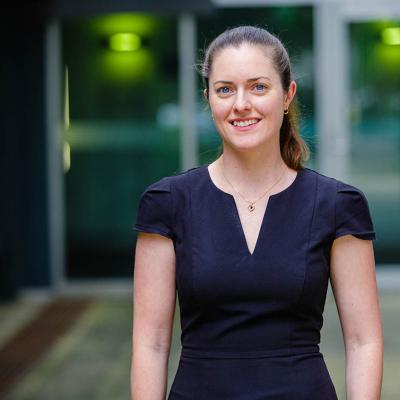Imagine a career where you make a real difference every day by helping people overcome health challenges, recover from injuries, and enhance their quality of life. That’s the essence of exercise physiology. In this dynamic field, you harness the power of exercise to transform lives and address health issues head on.
We spoke with Georgia McArdle and Michael Willshire, graduates of the UQ Bachelor of Clinical Exercise Physiology (Honours) program, to gain insight into their careers and what drives their passion. Georgia works in private practice, engaging with a diverse range of clients, while Michael supports individuals in corporate settings, including office workers, field workers, and public transport operators.
If you’re passionate about helping others and want to see meaningful results in your work, exercise physiology could be the perfect fit for you.
Make a real impact
Exercise physiology is about transforming lives. As an accredited exercise physiologist (AEP), you’ll create exercise programs that help people recover, manage chronic conditions, and stay healthy.
Whether it’s helping someone get back on their feet after surgery or supporting a client with diabetes to better manage their health, the work you do has a direct impact on people’s lives.
Plus, exercise physiologists focus on the whole person — physical fitness, mental health, and emotional wellbeing. Exercise isn’t just about getting stronger or fitter; it also helps reduce stress, boost mood, and improve overall life satisfaction.
"Exercise physiology is a great career choice because the work that you do can have such a positive impact on the people you see," says Michael.
"It genuinely changes lives for the better. This makes it a wonderfully fulfilling area of work."
No two days are the same
If you like variety in your work, exercise physiology will keep you on your toes.
You could be working in hospitals helping patients recover, in sports teams boosting athletes’ performance, or in private practice designing workout plans.
What's more, you'll work with a diverse clientele, from injured individuals and athletes to the elderly and those with chronic conditions.
Each day brings something new, and each setting offers unique challenges and rewards. It’s perfect for those who thrive on a dynamic and ever-changing career.
Career stability
The demand for exercise physiologists is skyrocketing. With more focus on preventing health issues and managing chronic diseases, there’s a growing need for experts in this field. As our population ages and the emphasis on long-term wellness increases, opportunities in exercise physiology are expanding rapidly.
This field not only offers a dynamic and exciting career but also promises a stable and growing job market. Exercise physiologists play a key role in helping people lead healthier lives, making it a secure and rewarding profession.
“There are many reasons why exercise physiology is an excellent career choice, but what I value most is its diversity," says Georgia.
"Each day is different because we’re qualified to work with people of all ages and backgrounds. Whether it’s in private practice, hospitals, sports teams, or running my own business, the opportunities are limitless.”
Emerging opportunities
Health care is evolving at a rapid pace, and exercise physiology is at the forefront of this transformation.
“The rise of digital health tools like telehealth, smartwatches, and fitness apps is changing how we deliver care and interact with patients. Aspiring exercise physiologists who embrace these new technologies will be able to reach more people and have an even greater impact on their clients' health.”
- Dr Shelley Keating
With the 2032 Olympic and Paralympic Games heading to Brisbane, things are about to get even more exciting. The demand for sports performance and rehab experts is about to take off, and exercise physiologists will be right in the action.
Whether you're helping elite athletes reach their peak or riding the wave of the "legacy effect" where everyday people are inspired to get active, there’s never been a better time to get involved. You'll have the chance to help more than just our athletes – you’ll be supporting people from all walks of life to lead healthier, more active lives.
Personal fulfilment
One of the best parts of being an accredited exercise physiologist is the personal fulfilment that comes with the job. Watching clients improve, overcome challenges, and regain confidence in their health is incredibly rewarding. Every time you see a patient smile after reaching their goal, it adds meaning to your work.
“The most fulfilling part about my job is being able to show people how to prioritise themselves again," says Georgia.
"No matter their history, or what has led them to us, we get to make strong relationships with people and be someone they can trust.”
"I have the privilege of working with a diverse array of individuals – office workers, field workers, and public transport operators – each at various stages of their health journeys. By understanding their unique goals, I guide them in improving and maintaining a healthy lifestyle through injury rehabilitation, health management, and tailored exercise prescriptions. Seeing their progress is truly rewarding."
- Michael
Continuous learning
The field of exercise physiology is always evolving, with new research and techniques emerging regularly. This constant development offers endless opportunities for learning and professional growth. Whether it's mastering the latest evidence-based practices or discovering innovative treatment methods, you'll continually expand your skills and knowledge.
Staying up to date with advancements not only keeps your work exciting but also ensures you're delivering the highest quality of care to your clients, helping them achieve the best possible outcomes.
"Exercise physiology is constantly evolving, offering endless opportunities for learning," says Michael.
"With new research and best practices around every corner, we can easily implement fresh insights into our practice. It's rewarding to educate clients about health and exercise and see them learn throughout the process."-
“Working in private practice allows me to collaborate with a team of exercise physiologists across various specialties. This environment fosters continuous learning and growth, enabling me to handle more complex cases. We engage in weekly professional development, exploring case studies and evolving our practices in line with emerging research and technology.”
- Georgia
Collaborative work environment
If you thrive in a dynamic setting, the collaborative nature of exercise physiology will keep you engaged. While exercise physiologists often work independently, they also have opportunities to connect with a variety of health professionals — think doctors, physiotherapists, and dietitians — to enhance patient care.
This team-based approach can improve treatment outcomes and offers a chance to share insights and expertise when collaboration occurs. Every day presents new challenges and perspectives, making it an exciting and rewarding career choice.
“As exercise physiologists, we see our clients as whole individuals, which demands a holistic approach to care," says Georgie.
"Often, they come with one primary concern but are managing additional conditions that shape our interventions. This makes our work dynamic and rewarding, constantly pushing us to problem-solve and adapt. It also allows us to collaborate closely with other allied health professionals, leveraging each other’s expertise to deliver the best outcomes.”
“I’m fortunate to work alongside practitioners with diverse experiences and insights. Our collaboration enables us to share different perspectives and tackle challenges together, ultimately enhancing the client experience through higher-quality care.”
- Michael
How to become an accredited exercise physiologist
To become an accredited exercise physiologist (AEP) in Australia, you’ll first need to complete a relevant degree, such as UQ’s Bachelor of Clinical Exercise Physiology (Honours). This degree will equip you with the knowledge and skills needed for a successful career as an AEP. Additionally, it opens doors to various career paths within the field of exercise physiology.
To study this degree, you’ll need to:
- Meet the program prerequisites.
- Meet the entry score threshold.
If your ATAR falls a little short of this threshold, there are other pathways to the Bachelor of Clinical Exercise Physiology (Honours). You may wish to enrol in a program that covers similar courses and content, and which requires a slightly lower ATAR, and then upgrade to the Bachelor of Clinical Exercise Physiology (Honours) after a year of study, based on your performance and GPA. This is called the tertiary studies pathway to university.
To take this pathway to the Bachelor of Clinical Exercise Physiology (Honours), you could first look at applying for:
- Bachelor of Human Movement and Nutrition Sciences
- Bachelor of Health Sciences
- Bachelor of Exercise and Sport Sciences (Honours)
After completing a Bachelor of Clinical Exercise Physiology, you can gain accreditation with Exercise and Sports Science Australia (ESSA) as both an accredited exercise physiologist and accredited exercise scientist.



